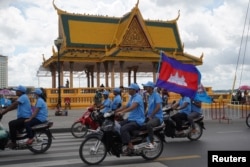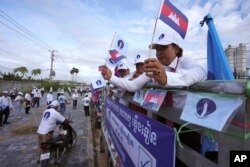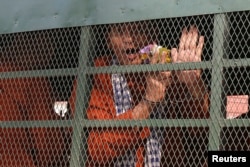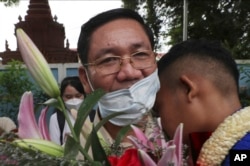On June 29, Cambodia’s Senate unanimously approved draft amendments to the country’s election law allowing the National Election Committee to penalize those who discourage others from voting.
The amendments would also prevent those who do not vote in the July 23 general election from participating in future races.
Cambodia’s Constitutional Council signed off on the amendments, and they will go into effect after being promulgated by the country’s king, who plays a largely ceremonial role.
Officials from long-serving Prime Minister Hun Sen’s ruling Cambodian People's Party, which has ruled the country for decades, say the changes are democratic, with the state-aligned Phnom Penh Post quoting Senate secretary Um Sarith:
“[T]he amendments were designed to promote the value of a multi-party democracy and strengthen Cambodia’s democratic process.”
That is misleading.
Boycotting elections or spoiling ballots is a form of political protest. In a context of systemic marginalization of political opposition, depriving citizens of that right does not result in promoting multi-party democracy.
“The recent calls on the public to boycott the upcoming polls or spoil their ballot are a direct result of the government’s crackdown on the political opposition. Most notably, the recent disqualification of the Candlelight Party from contesting in the election deprived citizens of a viable political alternative,” Chak Sopheap, executive director of the Cambodian Center for Human Rights, told Polygraph.info.
“This likely led many to lose interest in participating in the polls. If it wants to strengthen Cambodian democracy, the government should address the root causes of these calls instead of criminalizing them.”
On July 1, campaigning officially kicked off for what Reuters said will be a “virtually unopposed election” for strongman Hun Sen. The Associated Press called the CPP’s victory a “sure bet.”
Analysts widely believe Hun Sen, who has ruled Cambodia for nearly four decades, will pass the torch to his son, Hun Manet, who heads Cambodia’s army.
Hun Sen said he is “primed to let Hun Manet succeed me.”
Hun Sen’s CPP controls all 125 seats in the National Assembly (lower house) and all 58 elected seats in the Senate. The CPP secured that parliamentary sweep in the 2018 general elections after the main opposition Cambodia National Rescue Party was dissolved in 2017, allowing Hun Sen to run virtually unopposed.
That was followed by mass trials of people affiliated with the CNRP. United Nations Human rights experts called those trials “deeply flawed.”
During the 2018 general election, more than 7.64 million ballots, or 8.4% of the total, were invalid or spoiled, which Cambodia-based political analyst Lao Mong told Reuters was "a cunning yet legitimate protest against the powerful” in response to what critics called a sham election.
The amended election laws offer hefty fines for those who spoil ballots, or otherwise encourage others not to vote.
The Candlelight Party returned to the political scene in October 2021 after being inactive for nearly a decade.
While considered the country’s only effective opposition party, Reuters described the Candlelight Party as “a weakened reincarnation” of the CNRP.
In May, Cambodia’s election commission disqualified the Candlelight Party from participating in the general elections, saying it failed to submit a copy of its original party registration document.
The Candlelight Party said its registration document was lost after police confiscated it during a raid.
The Candlelight Party had been allowed to take part in June 2022 communal elections without the document. It won roughly 22 percent in that vote.
“The fact that the party was allowed to run in the 2022 Commune and Sangkat Council Elections exposes the arbitrary and politically motivated nature of this disqualification,” the Bangkok-based Asian Network for Free Elections said.
The CNRP had also performed well in June 2017 communal elections before being dissolved in November 2017.
Under Cambodia’s amended election law, those seeking office must have voted in at least two elections to qualify to run in future commune, district, municipality, provincial and/or national races.
The Associated Press reported “most prominent opposition figures” have left the country to avoid being jailed on what they allege are trumped-up charges.
David Hutt, a research fellow at the Central European Institute of Asian Studies, recently wrote that the election law changes would allow Cambodian authorities to placate Western governments by pardoning individuals like imprisoned CNRP co-founder Kem Sokha and allowing some exiled CNRP politicians to return to Cambodia, while also legally keeping them out of politics.
It remains unclear how broadly the new amendments prohibiting boycotting of the election will be interpreted.
“Prime Minister Hun Sen recently threatened Candlelight officials and members with arrest if they protested the exclusion of their party from the upcoming polls, leading them to delay plans for a peaceful demonstration in Phnom Penh,” Chak Sopheap told Polygraph.info.
“The government has often used broadly defined offenses to crack down on the rights to freedom of assembly and expression, and the fact that it could make similar use of the new provisions against anyone who protests the election raises great concerns and cannot be ruled out.”
Other right monitors, including the United Nations Human Rights Council, Human Rights Watch, and the international civil rights group Civicus, share that view.
In April, Candlelight Party Vice President Thach Setha was charged with allegedly inciting Cambodians working abroad to “overthrow the royal government.”
Authorities had already imprisoned Thach Setha in an alleged check-bouncing case, sidelining him from politics ahead of the election.
Other Candlelight Party members have faced legal troubles in the run-up to July elections.
Hun Sen has gone beyond threatening his opponents with the law.
"Either you face legal action in court, or I rally CPP people for a demonstration and beat you guys up,” Hun Sen said on January 9.
Amid this political climate, unknown assailants have repeatedly attacked members of the Candlelight Party and the CNRP, leaving some of them hospitalized.
Keat Sokchan, a member of the Candlelight Party’s youth movement, told Radio Free Asia he had spent more than a week in the hospital after one such attack in April.
Opposition politicians and activists say the Cambodian authorities have consistently declined to investigate those attacks.









